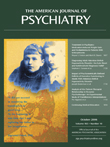Lingual Lesions With Orally Disintegrating Risperidone
To the Editor: There are reports of oral lesions occurring with the use of orally disintegrating atypical antipsychotic tablets. The reports of adverse reactions caused by orally disintegrating olanzapine indicate that mouth ulcerations and tongue edema are infrequent events, and glossitis and tongue discoloration are rare (1) . Paresthesia or anesthesia of the mouth, palate, or tongue; tongue discoloration; tongue edema; and taste loss have also been reported with the use of orally disintegrating mirtazapine (1 , 2) . To our knowledge, no case of oral lesions associated with the use of orally disintegrating risperidone (Risperdal M-tab) has been reported. There is documentation of rare events of tongue discoloration, tongue edema, and gingivitis, but these are not specifically referenced to orally disintegrating risperidone (1) . We report two cases of lingual lesions occurring during treatment with orally disintegrating risperidone.
“Ms. A,” a 44-year-old woman diagnosed with psychotic disorder, not otherwise specified, was given orally disintegrating risperidone (1 mg every morning, 2 mg at bedtime). After 3 days of treatment, she complained of tongue paresthesia, and multiple erythematous sloughing lesions were noted at the lingula tip and bilateral anterior areas. A physical exam was otherwise unremarkable. Concomitant medications included valsartan, 80 mg/day. Her medical history was significant for hepatitis C, hypertension, asthma, and a benign subependymoma. Orally disintegrating risperidone was discontinued, and the patient switched to risperidone tablets 3 mg/day (swallowed whole). The lesions resolved within 3 days.
“Mr. B,” a 22-year-old man with schizophrenia, was given orally disintegrating risperidone (1 mg b.i.d.). After 3 days of treatment, he complained of tongue anesthesia and tongue swelling. On day 4 of treatment, multiple erythematous lesions were noted at the lingula tip. A physical exam was otherwise unremarkable, and no concomitant medications were used. A medical history was noncontributory, and laboratory values were within normal limits. Orally disintegrating risperidone was discontinued, and the patient switched to risperidone tablets 2 mg/day (swallowed whole). The lesions resolved within 3 days.
We identified no case reports of lingual lesions associated with the use of orally disintegrating risperidone (3) . In our reported cases, oral lesions resolved after switching to the swallow formulation. Hence, a possible explanation for the induction of oral lesions may be related to the mechanism of disintegration and formulation constituents (1) . These cases illustrate the risk of developing oral lesions when treating patients with orally disintegrating risperidone. Clinicians should be mindful of these potential adverse effects. Based on our experience, resolution of symptoms is probable after discontinuation of the orally disintegrating formulation; however, new concerns are raised regarding potential interference with treatment compliance. This may be noteworthy, since orally disintegrating risperidone is marketed as a possible means for enhancing medication compliance.
1. Thompson Physician’s Desk Reference/Micromedex® Healthcare Series 2006; Volume 127Google Scholar
2. Kling A, Dahlqvist R, Johansson S, Backstrom M, Mjorndal T : Neurologic oral manifestations caused by a new formulation of mirtazapine. Neurology 2005; 65:333–334Google Scholar
3. Chue P, Welch R, Binder C: Acceptability and disintegration rates of orally disintegrating risperidone tablets in patients with schizophrenia or schizoaffective disorder. Can J Psychiatry 2004; 49:701–703Google Scholar



